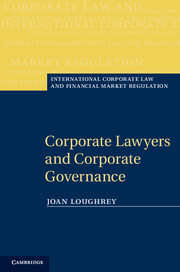Book contents
- Frontmatter
- Contents
- Preface
- Table of cases
- Table of statutes
- Table of statutory instruments
- International treaties
- List of abbreviations
- 1 Introduction
- 2 The international perspective
- 3 The roles of the corporate lawyer
- 4 Identifying the corporate client
- 5 The role of the corporate lawyer in intra-corporate litigation
- 6 The corporate lawyer as director
- 7 The regulation of the corporate lawyer
- 8 The case against reform
- 9 Reforming the role of the corporate lawyer
- 10 The reform of the legal profession and the role of the corporate lawyers
- 11 Conclusion
- Bibliography
- Index
2 - The international perspective
Published online by Cambridge University Press: 07 October 2011
- Frontmatter
- Contents
- Preface
- Table of cases
- Table of statutes
- Table of statutory instruments
- International treaties
- List of abbreviations
- 1 Introduction
- 2 The international perspective
- 3 The roles of the corporate lawyer
- 4 Identifying the corporate client
- 5 The role of the corporate lawyer in intra-corporate litigation
- 6 The corporate lawyer as director
- 7 The regulation of the corporate lawyer
- 8 The case against reform
- 9 Reforming the role of the corporate lawyer
- 10 The reform of the legal profession and the role of the corporate lawyers
- 11 Conclusion
- Bibliography
- Index
Summary
Introduction
This book draws on resources in the United States, Australia and Canada to critique the English regulation of corporate lawyers. These have been chosen because they have similar corporate environments to England, featuring dispersed share-ownership companies, and similar legal cultures. For example, in-house lawyers have the same professional status as external lawyers in all three, in contrast to the position in civil law jurisdictions, where in-house lawyers are considered to lack the independence necessary of a legal professional. Again, all have seen the growth of the large corporate law firm, and an increase in the numbers of in-house lawyers.
The United States is of particular interest: US corporate lawyers are direct competitors of English lawyers in the global legal services market, while significant numbers of US lawyers work in the United Kingdom. In addition, in the United States, in contrast to the United Kingdom, there is a rich seam of academic discussion, dating back to the Watergate scandal in the 1970s, about the ethics of, and law pertaining to, lawyers. More recently the collapse of Enron and the introduction of the Sarbanes-Oxley Act 2002 sparked a global debate about the role of corporate lawyers.
A comparative analysis must pay attention to the national context of the regulatory institutions, laws and processes which are being compared. Legal systems are part of the broader culture of the society in which they exist and will reflect that society's political, economic and social conditions and its history.
- Type
- Chapter
- Information
- Corporate Lawyers and Corporate Governance , pp. 19 - 47Publisher: Cambridge University PressPrint publication year: 2011



